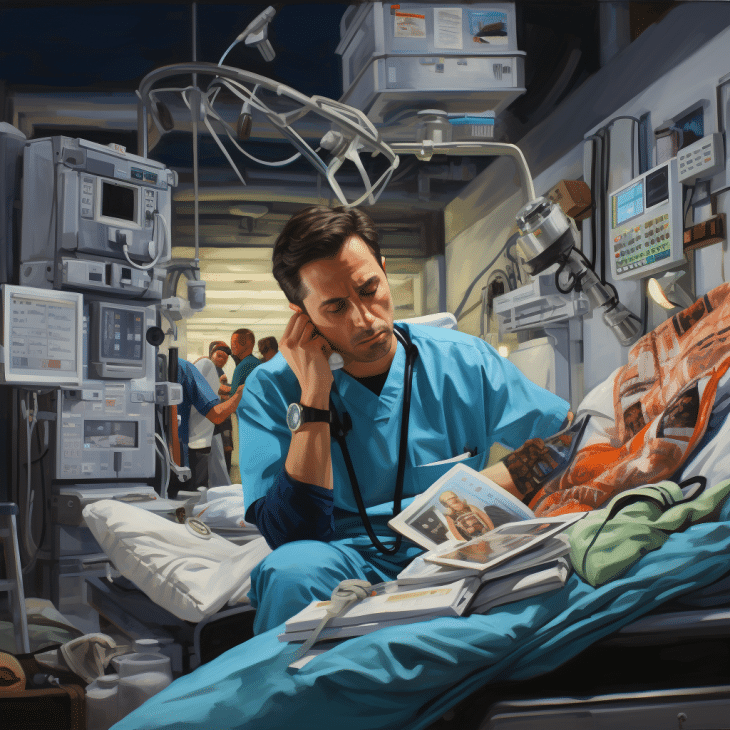Emergency medicine doctors work in a fast-paced, high-stress environment filled with interruptions and competing demands on their attention.
Research suggests that despite perceptions, true multitasking is limited in how it can be applied in this setting.
The ability to efficiently switch between tasks is a critical skill for emergency physicians.
Key Facts:
- Emergency doctors experience more interruptions than other physicians, up to 30 per 3 hours of work.
- Each interruption increases the risk that a task will be left incomplete.
- True multitasking, doing two things simultaneously, is only possible for automatic behaviors requiring little conscious thought.
- For complex medical tasks, doctors rapidly switch attention between tasks rather than multitask.
- Frequent task switching carries risks of errors and omissions in care.
- Strategies exist to train more effective and efficient task switching skills.
Source: Ann Emerg Med.
No Doctor Truly “Multitasks,” They Rapidly “Task Switch”
Emergency physicians care for the undifferentiated patient, managing everything from minor injuries to life-threatening conditions.
The emergency department is a busy, crowded, noisy environment with frequent interruptions.
Nurses, technicians, consultants, students, and other providers constantly compete for the emergency doctor’s attention.
Unlike an office visit, care is delivered at an urgent pace with critical decisions made under time pressure.
Tests, medications, procedures happen rapidly and simultaneously on multiple patients.
Despite misperceptions, emergency physicians do not truly multitask.
The demands exceed human cognitive capabilities.
Instead, emergency doctors have mastered the art of rapidly switching between many competing tasks.
What is “true” multitasking?
True multitasking means performing two tasks completely simultaneously and is only possible for behaviors so automatic they require minimal consciousness like walking and talking.
Complex medical tasks tap working memory, which can only handle 2-7 pieces of information at once.
The brain divides large tasks into smaller components and switches rapidly between them, creating the illusion of simultaneous multitasking.
External Interruptions Disrupt Physician Performance

In the emergency department, frequent interruptions force doctors to switch tasks unexpectedly.
Research shows each interruption increases the risk that tasks will be left incomplete.
Interrupted tasks are completed more quickly, likely due to pressure to move on to the next demand. Rushed completion raises the chance of errors.
Even routine tasks require considerable concentration in the chaotic ED environment.
Interruptions during key steps of complex tasks are especially prone to errors.
For example, steps may be missed when resuscitating a coding patient or intubating.
Internal Interruptions Also Distract Doctors
External interruptions from nurses, monitors, phone calls are obvious.
But emergency physicians also interrupt themselves to recall a task or follow up on a thought.
These internal interruptions are equally disruptive to workflow.
Whether external or internal, interruptions and the resulting task switches exact a mental cost.
Performance suffers from delayed completion of tasks, lapses in memory, increased workload and stress.
In professions like aviation and driving, interruptions clearly raise error rates.
Though data in medicine are lacking, it is prudent to minimize unnecessary disruptions of emergency physicians.
Task Switching Skills Can Be Improved
Despite the risks, task switching is unavoidable in emergency medicine.
Transitioning smoothly between patients and tasks is a required skill.
Thought leaders have proposed training programs to improve task switching abilities.
Individual providers can build expertise through:
- Prioritizing urgent tasks over less important interruptions
- Recognizing when interruptions can be avoided or deferred
- Practicing to make routine tasks automatic, requiring less concentration
- Using mental templates like checklists to reduce cognitive workload
- Managing anxiety that impairs ability to focus amidst chaos
Health systems can also optimize workflow by:
- Designating quiet areas for complex uninterrupted tasks
- Using EMR tools judiciously to avoid alert fatigue
- Training nurses when to avoid unnecessary interruptions
- Creating protocols where other staff field minor inquiries
- Building in forced reminders for follow up on results or orders
Simulation training allows providers to safely learn task management skills.
Progressive clinical responsibility develops real-world experience.
Novices are supervised to prevent anxiety from becoming overwhelming.
Focusing on Patient Safety is the Top Priority
Interruptions contribute to medical errors, but their true impact remains uncertain.
Since emergency medicine will remain a disruptive, high-risk environment, the focus must be on training doctors to task switch safely and efficiently.
Care teams can work together to minimize unnecessary distractions.
Proven techniques from aviation, the military, and business can be applied to develop expert performance despite unavoidable demands for parallel processing.
Most importantly, emergency physicians must maintain vigilance against threats to patient safety from fragmented attention and interrupted workflow.
Emergency Medicine Pushing Human Limits of Task Switching
Artificial intelligence has made impressive advances, but emergency medicine continues to push the limits of human multitasking capabilities.
No computer can replicate the parallel processing or cope with the chaos.
While technology like computerized order entry may help limit distractions, the essence of emergency medicine remains the ability to swiftly shift between critically ill patients and time-sensitive decisions.
Until cognitive science evolves, well-honed task switching skills will remain crucial to the practice of emergency medicine.
References
- Study: Can you multitask? Evidence and limitations of task switching and multitasking in emergency medicine
- Authors: L Melissa Skaugset et al. (2016)







